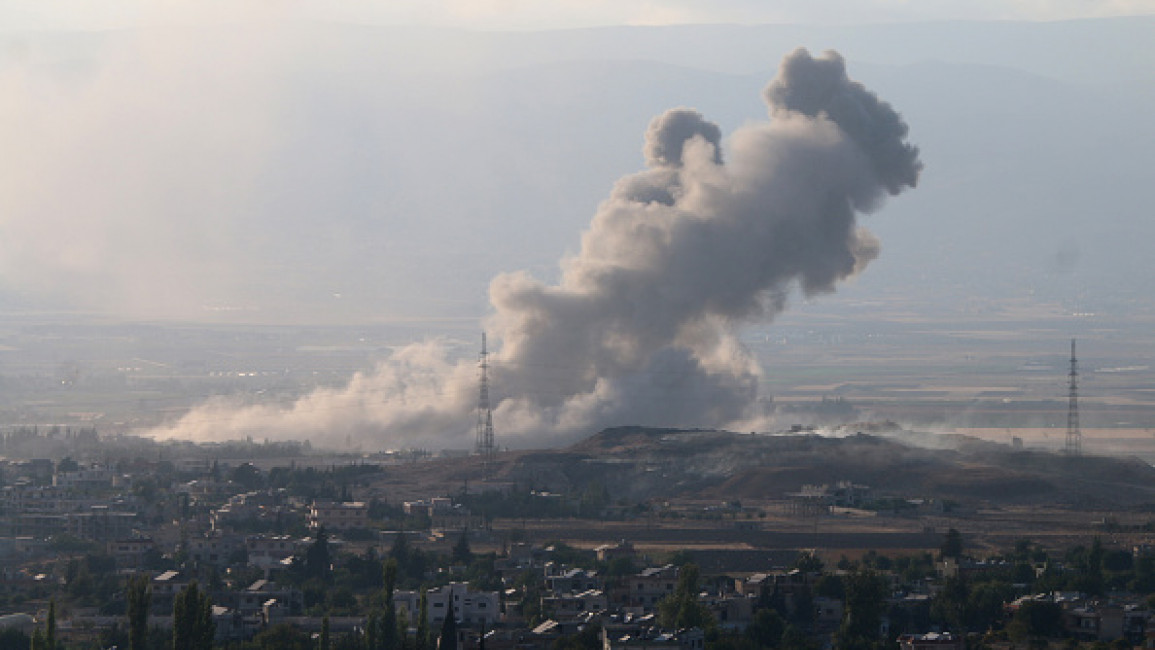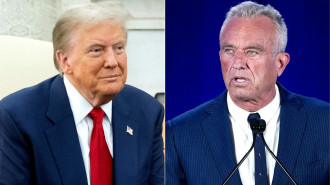'On the brink of the abyss': What is the world saying about Israel's strikes on Lebanon?
After Israel launched devastating airstrikes on Lebanon on Monday, killing at least 558 people, including 35 children, much of the world has reacted by warning against the prospect of an all-out war between Tel Aviv and Hezbollah.
The New Arab takes a look at different reactions to Israel’s dangerous escalation against Lebanon from around the world.
Egypt
On Monday, Egypt’s Ministry of Foreign Affairs released an official statement condemning “the dangerous Israeli escalation in Lebanon”, lamenting the loss of innocent life.
Cario further expressed its “heartfelt solidarity” with the people of Lebanon and reaffirmed its strong objection to any “violations of Lebanon’s sovereignty and territory”.
Additionally, the largest Arabic-speaking country urged the UN Security Council to “immediately intervene to stop the Israeli escalation in the region, which threatens the fate of its peoples and prospects for peace”.
Turkey
Turkey condemned the Israeli attacks on Lebanon as “attempts to drag the region into chaos”, calling for international action against Israel and an end to military and diplomatic support for the country.
In a statement issued late Monday, the Turkish Foreign Ministry said countries that “support Israel unconditionally” are helping Israeli Prime Minister Benjamin Netanyahu “shed blood for his political interests”.
“It is an imperative that all institutions responsible for maintaining international peace and security, especially the UN Security Council, as well as the international community, take the necessary measures without delay,” the statement added.
Jordan
Hundreds of Jordanians participated in a mass rally near the Israeli embassy in Amman, in support of the people in Gaza and and in condemnation of Israel’s aggression against civilians in Lebanon.
Protesters chanted slogans supporting “the resistance” in both Gaza and Lebanon, as well as calling for Jordan, and all Arab countries, to immediately suspend peace treaties and normalisation with Israel.
The protesters also denounced the US for its “unlimited support” for Israel.
UAE
The UAE expressed its “deep concern over the Israeli attacks on Lebanon while calling for “concerted international efforts to stop the fighting and prevent bloodshed”, stressing the need to resolve differences through diplomatic means.
The UAE Ministry of Foreign Affairs said in a statement that Abu Dhabi expressed its deep concern over “the continued escalation and its repercussions on security and stability in the region.”
The statement further called for “the need for concerted international efforts to stop the fighting to prevent bloodshed, and for civilians to enjoy full protection under international law and international treaties.”
Saudi Arabia
The kingdom said that it is following with “great concern” the developments in Lebanon, and reiterated its warning of “the danger of the expansion of violence in the region.”
The Saudi Foreign Ministry said on its account on X on Monday evening that it “is following with great concern the developments of the security events taking place in Lebanese territory, and renews its warning of the danger of the expansion of violence in the region,” and urged “all parties to exercise the utmost restraint and keep the region and its people away from the dangers of war.”
Qatar
Qatar condemned “in the strongest terms the Israeli aggression on Lebanon”, warning of the expansion of the circle of violence in the region and its slide into a comprehensive regional war in light of Israel’s ongoing war on the Gaza Strip.
The Qatari Foreign Ministry said in a statement on Monday that the continued escalation is “primarily due to the absence of any deterrent to Israel’s actions, its continued repeated violations of international law, and its continued impunity.” It also warned that this reality “exacerbates the crises, puts the region on the brink of the abyss, and exposes it to more tensions that will have a profound impact on the regional and international levels.”
Iran
Despite Hezbollah being a major ally of Tehran, it has remained relatively quiet about Israel’s attack on Lebanon. However, on Monday, Foreign Minister, Abbas Araqch denied that President Massoud Pezeshkian had said, during his current visit to New York, that Tehran was willing to reduce tensions with Israel.
"Mr Pezeshkian never made such a statement", Araqchi claimed.
Bloomberg had quoted Pezeshkian as saying earlier in the day that Iran was "willing to put all our weapons aside so long as Israel is willing to do the same".
However, Pezeshkian did tell CNN that the world "must not allow Lebanon to become another Gaza".
USA
The United States is presenting "concrete" ideas to ease the crisis in Lebanon, a US official said Monday, while voicing opposition to any Israeli ground invasion to target Hezbollah.
"We've got some concrete ideas we're going to be discussing with allies and partners this week to try to figure out the way forward on this," the senior US official said as world leaders gathered in New York for the UN General Assembly.
The official, speaking on condition of anonymity, said that the United States wanted to find an "off-ramp that will first and foremost prevent further escalation in the fighting."
He voiced hope that the US proposals would "reduce tensions and will segue into a diplomatic process that allows communities on both sides of the border -- on both sides of the Blue Line -- to safely return home in the near future."
The official declined to describe the concrete ideas in detail but said that Secretary of State Antony Blinken and other senior US officials would be discussing them during his meetings at the General Assembly.
European Union
EU foreign affairs chief Josep Borrell said on Monday that the escalating clashes between Israel and Lebanon's Iran-backed Hezbollah threaten to plunge the Middle East into all-out war.
"I can say we are almost in a full-fledged war," Borrell said ahead of a gathering of world leaders at the United Nations.
"We're seeing more military strikes, more damage, more collateral damage, more victims."
UK
UK Foreign Secretary David Lammy said he was “deeply alarmed by rockets and air strikes in Lebanon and Israel and resulting civilian casualties”.
“Further escalation risks even more devastating consequences. I repeat my call for an immediate ceasefire on both sides, which I will emphasise when I meet G7 ministers tonight,” he added in a post on X.







 Follow the Middle East's top stories in English at The New Arab on Google News
Follow the Middle East's top stories in English at The New Arab on Google News
![The new film casts Israeli actors to tell the story of Mary while leaving out Palestinians [Getty]](/sites/default/files/styles/image_330x185/public/2024-11/GettyImages-2172155541.jpg?h=199d8c1f&itok=wJWyXDEQ)
![Ben & Jerry's has taken Unilever to court for its alleged attempts to silence it [Getty]](/sites/default/files/styles/image_330x185/public/2024-11/GettyImages-2183900214.jpg?h=199d8c1f&itok=jEcYtQ64)
